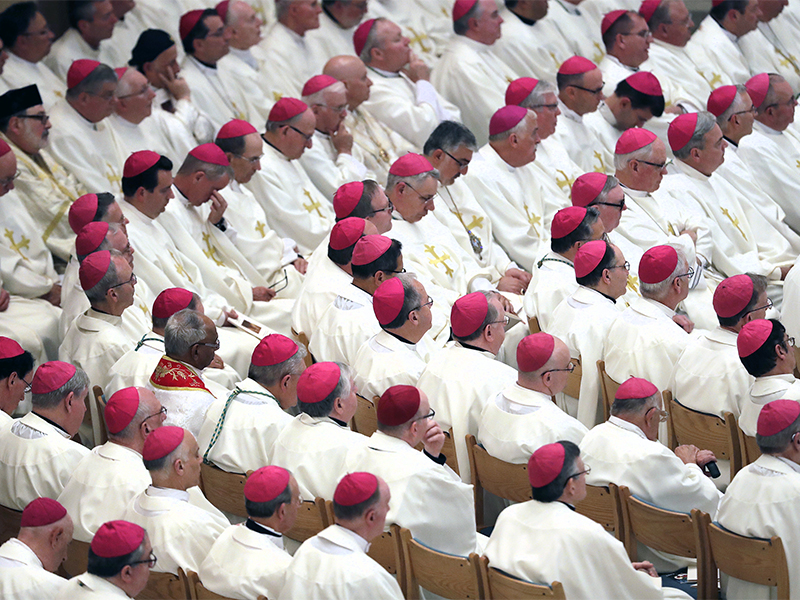(RNS) — Although many evangelical ministers warmly embraced Donald Trump as the Republican Party presidential candidate, the U.S. Catholic bishops never publicly endorsed him. They did express strong support for some of his positions — for example, his opposition to abortion and his support for religious freedom. That, together with their negative response to the views of Hillary Clinton, made many observers believe that although the bishops did not publicly endorse him, they were happy to see him elected.
Their happiness was evident with the reinstatement of the “Mexico City policy,” a U.S. government policy that bans international organizations from receiving federal funds if they sponsor abortions. Likewise, the bishops supported Trump’s efforts to deny taxpayer funding to Planned Parenthood. They also approved his executive order instructing federal agencies to respect the religious freedom of believers and their organizations. Most importantly, they were delighted with his appointment of Neil Gorsuch to the U.S. Supreme Court because of their expectation that he will be a pro-life justice.
But the relationship between Trump and the Catholic bishops appears to be a marriage of convenience rather than the love affair he has with evangelical ministers. Already there have been some public spats.

President Trump on July 24, 2017. Photo by Carlos Barria/Reuters
Most recently, in response to the events at Charlottesville, the bishops have established an ad hoc committee against racism. The chair of the committee, Bishop George Murry of Youngstown, Ohio, said, “Recent events reveal yet another reminder of what can be traced back to the original sin of the United States: racism.” Other bishops, like Cardinal Blase Cupich of Chicago, also spoke out in a way that could be interpreted as critical of the president’s wishy-washy response to Charlottesville. “There can be no equivocating,” Cupich wrote in his archdiocesan newspaper. “Racism is a sin. White supremacy is a sin. Neo-Nazism is a sin.”
This is not the bishops’ first break with President Trump.
At the beginning of February, the bishops found it “troubling and disappointing” that he did not roll back the Obama executive order prohibiting federal contractors from discriminating on the bases of sexual orientation and gender identity. Here Trump was more liberal than the Catholic bishops. Nor has he yet dealt with their concerns about the contraceptive mandate in the Affordable Care Act.
But what really bothers the bishops is the president’s actions on immigration and refugee policy. During the first seven months of the Trump administration, the bishops issued over 20 statements on the treatment of immigrants and refugees, all of them very critical of the Trump administration.
Nor did they mince their words.
The bishops said they were “disheartened,” “deeply troubled,” “deeply concerned” and “disappointed” by the president’s actions on immigration and refugees. They worried about “bigotry,” “fear and intolerance.” The president’s actions were “alarming,” “devastating” and “injurious.” He was putting people “in harm’s way” and making “migrants, especially vulnerable women and children, more susceptible to traffickers and smugglers.” They protested the president’s executive order that “virtually shuts down the refugee admissions program,” which affected resettlement programs run by the church.
The president’s policies, they complained, “needlessly separate families, upend peaceful communities, endanger the lives and safety of the most vulnerable among us, break down the trust that currently exists between many police departments and immigrant communities, and sow great fear in those communities.”
These are not love notes. They are the shrill cries of a spouse who feels her children are being neglected and abused.
Likewise, the Catholic bishops, who had not supported Obamacare because of their concerns about abortion and birth control, failed to come to Trump’s assistance in its repeal. During the first seven months of this year, they strongly argued in 11 statements against repeal of Obamacare unless something better for the poor were enacted. They especially fought any rollback in the expansion of Medicaid or subsidies to low-income people buying insurance, which were at the heart of the Republican plans.
“To end coverage for those who struggle every day without an adequate alternative in place would be devastating,” said the bishops in July. “The American Health Care Act legislation from the U.S. House of Representatives and the Better Care Reconciliation Act from the Senate were seriously flawed, and would have harmed those most in need in unacceptable ways. In the face of difficulties passing these proposals, the appropriate response is not to create greater uncertainty, especially for those who can bear it least, by repealing the ACA without a replacement.”
The bishops are exhibiting all the signs of a potential breakup with Trump. The honeymoon is over. Corporate America is already distancing itself from Trump as if he were a lame duck with no future. Even Republican members of Congress are grumbling. Since in the bishops’ minds this marriage never took place, it may be easy for them to quietly climb out of bed and disappear into the night. They have gotten most of what they wanted out of the liaison; it is time to move on before it is too late.
(The Rev. Thomas J. Reese, a Jesuit priest, is a Senior Analyst at RNS. The views expressed in this opinion piece do not necessarily reflect those of Religion News Service)






